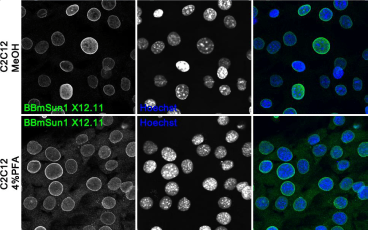Anti-Sun1 [BBmSun1 X12.11] monoclonal antibody
Invented by Brian Burke
Invented at A*STAR Accelerate Technologies Pte Ltd
- Datasheet
- References (5)
- Inventor Info
Info
| Catalogue Number | 154471 |
| Applications | IHC IF WB |
| Antigen/Gene or Protein Targets | Sun1 type II membrane protein |
| Synonyms | Sun1 |
| Reactivity | Mouse |
| Relevance |
SUN (Sad1, UNC-84) domain-containing proteins are type II membrane proteins that span the inner nuclear membrane. SUN proteins interact with lamins and other proteins in the nucleoplasm and with KASH (Klarsicht, ANC-1, and Syne homology) domain-containing proteins in the perinuclear space. Since the KASH proteins span the outer nuclear membrane and interact with components of the cytoskeleton, the SUN-KASH complex, also known as the LINC complex (LInker of the Nucleoskeleton and Cytoskeleton), provides a physical link between the nuclear interior and the cytoskeleton. The LINC complex is involved in diverse cellular functions including nuclear architecture, nuclear anchorage and migration, meiotic chromosome movement and cytoskeletal organization. Not surprisingly, aberrations in the LINC complex have been associated with number of human genetic diseases, including muscular dystrophy, cerebellar ataxia, hearing loss and infertility (1-3). Sun1 is one of at least five mammalian SUN protein family members and is ubiquitously expressed. Of note, Sun1 undergoes extensive alternative splicing. Human and mouse tissues express simultaneously several isoforms with the presence and prevalence of specific isoforms being tissue dependent (4,5). |
| Host | Mouse |
| Immunogen | Bacterially expressed fragment (close to the Sun domain) of mouse Sun1. The details of the immunogen is proprietary information. The antibody should detect all the known isoforms. |
| Positive Control | C2C12, mouse fibroblast |
| Molecular Weight (kDa) | Mouse 102 kDa; existence of multiple short isoforms |
| Notes |
Applications: - Immunohistochemistry: paraffin sections, cryosections - Immunocytochemistry/Immunofluoresence: formaldehyde, methanol fixation - Western Blot Knock-out validated Species reactivity: Mouse, does not react with human, however not tested on other species. |
| Research Area | Gene Expression, Genetic Studies Tools |
References: 5 entries
Nishioka et al. 2016. Nucleus. 7(6):572-584. PMID: 27858498.
Horn et al. 2014. Curr Top Dev Biol. 109:287-321. PMID: 24947240.
Rothballer et al. 2013. Nucleus. 4(1):29-36. PMID: 23324460.
Göb et al. 2011. Commun Integr Biol. 4(4):440-2. PMID: 21966565.
Crisp et al. 2006. J Cell Biol. 172(1):41-53. PMID: 16380439.
Add a reference
References: 5 entries
Nishioka et al. 2016. Nucleus. 7(6):572-584. PMID: 27858498.
Horn et al. 2014. Curr Top Dev Biol. 109:287-321. PMID: 24947240.
Rothballer et al. 2013. Nucleus. 4(1):29-36. PMID: 23324460.
Göb et al. 2011. Commun Integr Biol. 4(4):440-2. PMID: 21966565.
Crisp et al. 2006. J Cell Biol. 172(1):41-53. PMID: 16380439.
Add a reference
Inventor Information
Inventors

|
Brian Burke |







![Image thumbnail for Anti-Sun1 [BBmSun1 X12.11] monoclonal antibody](https://res.cloudinary.com/ximbio/image/upload/c_fit,fl_lossy,q_auto/8f95a2f7-21c6-4d6e-8be8-cf5534cb6cb8.png)
![Image thumbnail for Anti-Sun1 [BBmSun1 X12.11] monoclonal antibody](https://res.cloudinary.com/ximbio/image/upload/c_fit,fl_lossy,q_auto/5b248c28-3045-4837-99ec-4aa320df97ba.png)
![Image thumbnail for Anti-Sun1 [BBmSun1 X12.11] monoclonal antibody](https://res.cloudinary.com/ximbio/image/upload/c_fit,fl_lossy,q_auto/b926a8c0-3355-43ba-87b1-365144b1f130.png)
![Image thumbnail for Anti-Sun1 [BBmSun1 X12.11] monoclonal antibody](https://res.cloudinary.com/ximbio/image/upload/c_fit,fl_lossy,q_auto/d328798a-38d1-4182-9348-cfa1bfd2c4db.png)
![Image thumbnail for Anti-Sun1 [BBmSun1 X12.11] monoclonal antibody](https://res.cloudinary.com/ximbio/image/upload/c_fit,fl_lossy,q_auto/52317ddf-3761-429b-a99d-bda7f7a156b6.png)
![Image thumbnail for Anti-Sun1 [BBmSun1 X12.11] monoclonal antibody](https://res.cloudinary.com/ximbio/image/upload/c_fit,fl_lossy,h_45,q_auto/8f95a2f7-21c6-4d6e-8be8-cf5534cb6cb8.png)
![Image thumbnail for Anti-Sun1 [BBmSun1 X12.11] monoclonal antibody](https://res.cloudinary.com/ximbio/image/upload/c_fit,fl_lossy,h_45,q_auto/5b248c28-3045-4837-99ec-4aa320df97ba.png)
![Image thumbnail for Anti-Sun1 [BBmSun1 X12.11] monoclonal antibody](https://res.cloudinary.com/ximbio/image/upload/c_fit,fl_lossy,h_45,q_auto/b926a8c0-3355-43ba-87b1-365144b1f130.png)
![Image thumbnail for Anti-Sun1 [BBmSun1 X12.11] monoclonal antibody](https://res.cloudinary.com/ximbio/image/upload/c_fit,fl_lossy,h_45,q_auto/d328798a-38d1-4182-9348-cfa1bfd2c4db.png)
![Image thumbnail for Anti-Sun1 [BBmSun1 X12.11] monoclonal antibody](https://res.cloudinary.com/ximbio/image/upload/c_fit,fl_lossy,h_45,q_auto/52317ddf-3761-429b-a99d-bda7f7a156b6.png)
